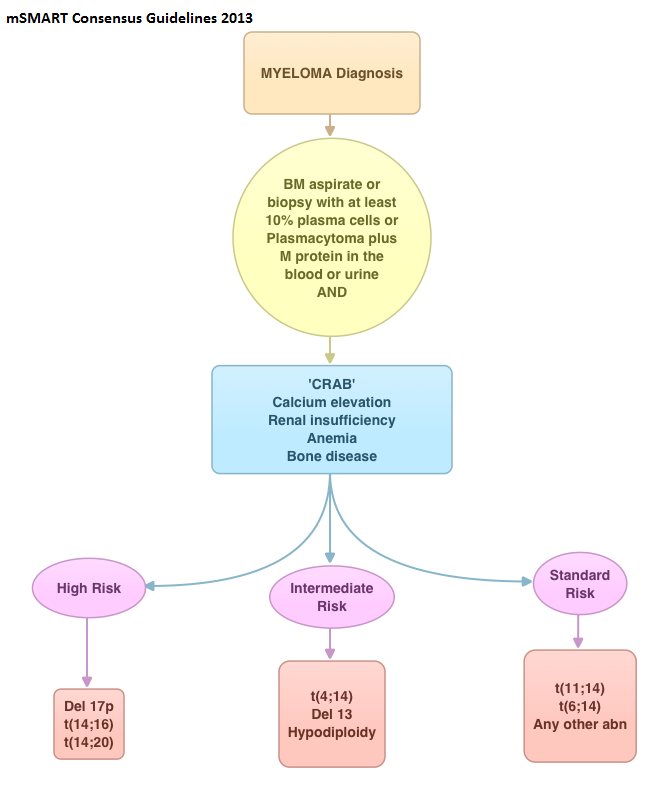SUMMARY: Multiple Myeloma is a clonal disorder of plasma cells in the bone marrow and the American Cancer Society estimates that in the United States, about 30,330 new cases will be diagnosed in 2016 and 12,650 patients will die of the disease. Multiple Myeloma is a disease of the elderly, with a median age at diagnosis of 69 years and characterized by intrinsic clonal heterogeneity. Nonetheless, patients 75 years or older, are often under-represented in clinical trials because of increased comorbidities and altered pharmacodynamics. This group of elderly, newly diagnosed Multiple Myeloma patients, who are ineligible for Stem Cell Transplantation (SCT), are often treated with combination therapies such as Melphalan, Prednisone, and Thalidomide (MPT), VELCADE® (Bortezomib), Melphalan, and Prednisone (VMP) or REVLIMID® (Lenalidomide) and low dose Dexamethasone (Rd). However there is limited data regarding the efficacy and safety of front line use of REVLIMID® in this patient group.
The FIRST (Frontline Investigation of REVLIMID® Plus Dexamethasone Versus Standard Thalidomide) trial is a randomized, global, phase III trial, in which the efficacy and safety of REVLIMID® and Dexamethasone, given until disease progression or for a fixed number of cycles, was compared with MPT given for a fixed number of cycles, in patients with newly diagnosed Multiple Myeloma, who were ineligible for Stem Cell Transplantation. A total of 1,623 patients were randomly assigned patients in a 1:1:1 ratio to receive REVLIMID® and Dexamethasone (Rd continuous) in 28 day cycles until disease progression, REVLIMID® and Dexamethasone (Rd18) in 28 day cycles for 72 weeks (18 cycles), or MPT in 42 day cycles for 72 weeks (12 cycles). In both REVLIMID® groups, patients received REVLIMID® 25 mg orally daily on days 1 – 21 of each 28 day cycle, and Dexamethasone 40 mg orally on days 1, 8, 15, and 22. Patients in the MPT group received Melphalan 0.25 mg/kg/day orally on days 1- 4, Prednisone 2 mg/kg/day orally on days 1- 4 and Thalidomide 200 mg orally daily, administered in 42 day cycles. The median patient age was 73 years and 35% of the patients were older than 75 years. Patients were stratified by age (75 years or less versus more than 75 years) and disease stage. The Primary end point was Progression Free Survival (PFS) and Secondary end point included Overall Survival (OS), Overall Response Rate (ORR), Duration of Response (DOR), time to first response and Time to Treatment Failure. The primary objective was to compare the efficacy of Rd continuous with MPT.
In this updated analysis after a median follow up of 45.5 months, Rd continuous reduced the risk of progression or death by 31% compared with MPT (HR=0.69; P<0.001) overall. In patients 75 years or younger, Rd continuous reduced the risk of progression or death by 36% (HR=0.64; P<0.001) and by 20% (HR=0.80; P=0.08) in those older than 75 years. Patients in the Rd continuous group also had a longer median Overall Survival than those in the MPT group regardless of age, and there was a 14 month Overall Survival advantage for the group of patients 75 years or older. In the Rd continuous group, grade 3-4 adverse events were similar across age groups although older patients had more frequent REVLIMID® dose reductions.
The authors concluded that the FIRST study results, with the largest cohort of patients 75 years or older, support Rd continuous treatment as a new standard of care for Stem Cell Transplantation-ineligible patients with newly diagnosed Multiple Myeloma. Updated Outcomes and Impact of Age With Lenalidomide and Low-Dose Dexamethasone or Melphalan, Prednisone, and Thalidomide in the Randomized, Phase III FIRST Trial Hulin C, Belch A, Shustik C, et al. J Clin Oncol 2016;34:3609-3617

